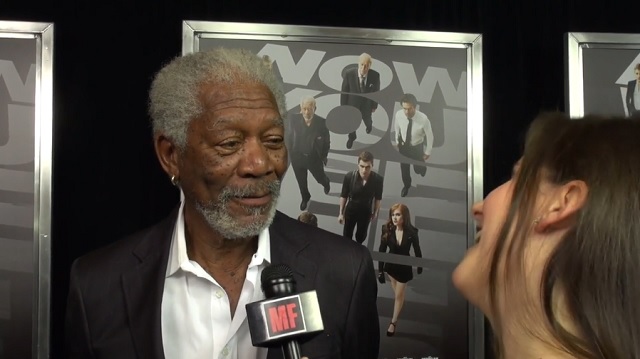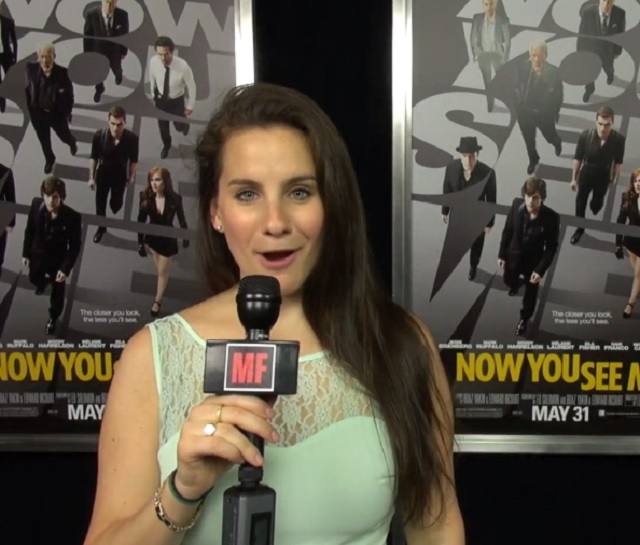Journo Realizes Years Later She Was 'Damaged' By Morgan Freeman's Lewd JokeChris MenahanInformationLiberation May. 28, 2018 |
Popular 
Only 15 Senators Vote to Block Arms to Israel, Despite Majority of Americans Wanting Aid to End

IDF Gunned Down Gaza Paramedics in Clearly Marked Emergency Vehicles, Recovered Video Shows

Key October 7th 'Mass Rapes' Witness Featured in Sheryl Sandberg Film 'Exposed as a Serial Liar'

Rabbi Tells Senate Hearing It's 'Not Enough' to Be 'Not Anti-Semitic' - 'One Must Be Anti-Anti-Semitic'

Sen. Schumer: 'My Job is to Keep the Left Pro-Israel'
  Entertainment journalist Maggie Parker realized in the wake of Morgan Freeman's #MeToo moment that she too is a victim of his "harassment" because he made a lewd joke about her on a red carpet back in 2013. Entertainment journalist Maggie Parker realized in the wake of Morgan Freeman's #MeToo moment that she too is a victim of his "harassment" because he made a lewd joke about her on a red carpet back in 2013.Though she laughed about it at the time and hoped the video would go viral, she said the video did not go viral and she now realizes she's a "victim." From PEOPLE: I was a 25-year-old, green and determined on-camera reporter for a men's magazine when I first met Freeman at the premiere of Now You See Me in 2013. My videographer and I decided to ask each actor, from Freeman to Mark Ruffalo to Isla Fisher to Michael Caine, "If you could do one magic trick, what would it be?" [...]The video shows her laughing and covering her mouth while blushing. But that quickly dissipated, because we got something good. On camera. The clip was funny and juicy. Surely, this will blow up. I went home, excited to see the video live, but also feeling like something was off and I couldn't quite put my finger on it. I blamed it on the fact that I didn't react quicker--"must work on caught-off-guard reaction for the future," I noted to myself. The only blame I placed that night was on myself. How does that make any sense?As the video failed to make her famous, she now realizes it was harassment. Almost exactly five years later, I'll never forget my mint green dress that felt like it was being taken off with Freeman's eyes. At the same time, I'll also never forget feeling slightly flattered--a very, very famous actor told me I'm attractive. Not in those words. But, he did. That's kind of cool...right?  [...]It never really hit me that it was harassment. There are so many inadvertent boundaries placed on people when it comes to sexual misconduct. Victims often experience guilt for feeling harassed when someone out there has had it much worse than them, or think that they're overreacting about just some silly comment. That is the last thing a victim should feel.The #MeToo movement made her realize she was actually "degraded." Then the Harvey Weinstein news broke, and I finally realized there was a legitimate reason something felt off that night. I should never have been exposed to such degrading comments, especially in the workplace, regardless of how minor and fleeting the moment was. I was more than a body, but in that moment, Freeman made me feel otherwise.  First of all: No one knows how that affected me but me. Second of all: That's the exact problem. That I didn't automatically get offended. Reading the accounts of Weinstein's accusers helped me realize why I brushed it off--the same reason many women did with Weinstein, and Matt Lauer, and Louis C.K., and so on: that just wasn't how it worked. Famous men were untouchable. They really could do no wrong. This was OK. If anything, it was good to get the attention of a famous man...whatever kind of attention that was.To repeat: not only did she laugh about it at the time and find it flattering, she told the story repeatedly throughout her life "apparently" wearing it "like a badge of honor." Now, realizing her career at PEOPLE is not where she wants it to be and angry that the split-second interaction failed to make her famous, she realizes she was the victim of "harassment" and blames Freeman for "damaging" her and ruining her life. Follow InformationLiberation on Twitter, Facebook and Gab. |



